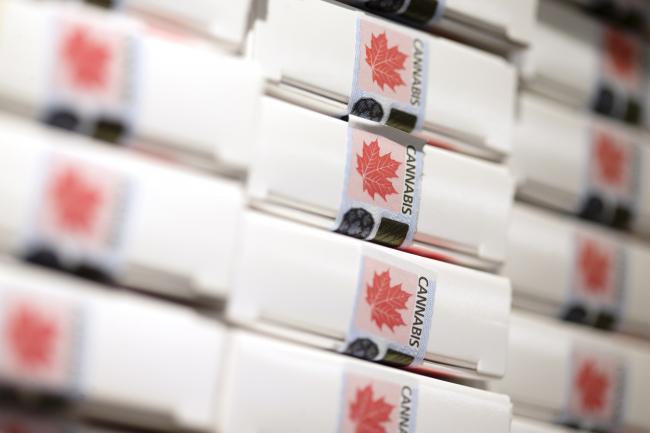(Bloomberg) -- Canada’s drive to legalize marijuana kicks off early Wednesday with store openings on the Atlantic Coast, giving the country a massive head start in developing a global pot market that some analysts peg at $150 billion.
Stores in St. John’s, Newfoundland are set to be the first to sell recreational cannabis, with some planning to open at 12:01 a.m. local time, followed by more than 100 outlets and websites opening across the country of 37 million people. It’s an historic moment for an industry that has rapidly moved from the fringe to the mainstream.
“The eyes of the world are on are Canada and Canadians should feel very proud, because people have been fighting for decades to make this moment a reality,” said Brendan Kennedy, chief executive officer of Tilray Inc., the largest cannabis company by market value.
Canada is the second country in the world to legalize recreational pot nationally after Uruguay. As a result, it has become thefront-runner in the global cannabis industry, expected to reach $32 billion in consumer spending alone by 2022, according to Arcview Market Research and BDS Analytics. The entire global market, meanwhile, could eventually be worth $150 billion, according to estimates from Roth Capital Partners.
Medical marijuana has been legal in Canada since 2001 but it’s only been about four years since the first cannabis companies began to list on Canadian exchanges. In that short time, about 140 pot companies have gone public in Canada, with a combined market value of more than C$60 billion ($48 billion).
Parties are planned across the country to usher in the dawn of so-called Green Day. In small towns like Smiths Falls, Ontario, home to Canopy Growth Corp., executives and employees will celebrate together, while several events are being planned in Toronto, including smoke-outs, "pop-up" venues by marijuana companies, parties and other gatherings that start in the morning and carry into the evening.
In Quebec, the government-controlled Societe Quebecoise du Cannabis plans to offer about 110 products at the dozen stores that are ready for Day 1. The number of locations could grow to as many as 150 within three years, the company estimates.
“We are very ready,” Jean-Francois Bergeron, a vice-president at the liquor control board that’s overseeing the new entity, told reporters Tuesday. “We have inventory, we have the stock on site, we have all the points of sale ready to kick in, employees are trained.”He said Quebec is prepared because it signed its supply agreements six months ago and has about 90 percent of the products listed.
Because cannabis remains federally illegal in the U.S., Canada’s investment bankers do most of the industry’s deals and its stock exchanges list most of the industry’s stocks. This has been a boon for the country as cannabis stocks have rocketed higher, drawing comparisons to cryptocurrency and the dot-com bubble. Since Canopy Growth announced a $3.8 billion investment from alcohol giant Constellation Brands Inc (NYSE:STZ). in mid-August, investors have piled into the sector, sending the Horizons Marijuana Life Sciences Index ETF up by 70 percent.
Individual stocks have posted even more outsized gains, with investor darling Tilray gaining more than 800 percent since its July IPO. Tilray’s market value is almost $15 billion, bigger than Campbell Soup Co. and on revenue of just $9.7 million in its last quarter.
Whatever your view on pot stocks, the world seems fascinated by Canada’s legalization experiment.
“I think it’s a very important moment in the history of this movement,” Adam Bierman, CEO of U.S. cannabis retailer MedMen Enterprises Inc., said in an interview. “The whole nation is watching.”
Supply Challenges
Still, the rollout of legal cannabis sales isn’t expected to be totally smooth. Aphria Inc. CEO Vic Neufeld said he expects supply shortages in the early stages of adult use as licensed producers struggle to meet demand. Only a handful of retail locations were up and running on Oct. 17, including just one store in British Columbia and none in Ontario, Canada’s most populous province where only online sales will be allowed. And the black market is expected to stay in business, as the supply of legal pot will meet only 30 percent to 60 percent of demand after legalization, according to a study by researchers at the University of Waterloo and the C.D. Howe Institute.
Kennedy predicted that legalization in Canada will follow the same trajectory as in states like Colorado, Oregon and California, with inevitable supply shortages in the early days.
“We’ve seen that everywhere,” he said. “Most adult-use programs are supply constrained at the outset but ramp up and reach an equilibrium between supply and demand in the first 6 to 12 months.”
He also expects another country to follow suit with recreational legalization in the next year.
